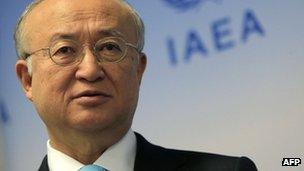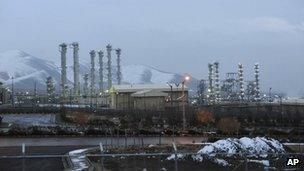Iran nuclear talks going round in circles - IAEA chief
- Published

Yukiya Amano said Iran was in "clear contravention" of UN Security Council resolutions
Talks with Iran on its nuclear programme have been "going around in circles", according to the head of the International Atomic Energy Agency.
Despite intensified dialogue since January 2012 on the possible military dimensions of the programme, there had been no agreement, said Yukiya Amano.
It might no longer be possible to find evidence of nuclear weapons research at the Parchin site, he added.
The West believes Iran wants to develop nuclear weapons, which it denies.
Earlier, Iraq's deputy prime minister warned Israel that it would not tolerate the use of its airspace for a military strike on Iran's nuclear sites.
Hussein Shahristani told the AFP news agency that Israel's government had been informed via a third party that it would have to "bear the consequences" if Iraq's sovereignty was violated.
Israel, widely assumed to be the Middle East's only nuclear-armed state, has refused to rule out military action to halt Iran nuclear programme, which it considers an existential threat.
'Concrete results'
Iran was expected to dominate discussions at the 35-nation Board of Governors of the IAEA at its headquarters in Vienna on Monday.
Speaking at the start of proceedings, Mr Amano showed his exasperation with the lack of progress during 10 rounds of negotiations between Iran and the so-called P5+1 - the US, UK, France, Russia, China plus Germany - over the past 17 months.
"Despite the intensified dialogue between the agency and Iran... no agreement has been reached on the structured approach document. To be frank, for some time now we have been going round in circles," he said.
"This is not the right way to address issues of such great importance to the international community, including Iran."
He added: "We need to achieve concrete results without further delay to restore international confidence in the peaceful nature of Iran's nuclear activities."
Mr Amano complained that IAEA inspectors had been unable to gain access to the Parchin military facility, south of Tehran, since 2011.

A heavy-water research reactor being built near the central town of Arak
Concerns about its possible role in Iran's nuclear programme emerged in 2004, when reports surfaced that a large explosives containment vessel had been built there to conduct hydrodynamic experiments.
The IAEA has warned that hydrodynamic experiments, which involve high explosives in conjunction with nuclear material or nuclear material surrogates, are "strong indicators of possible weapon development".
Iran has denied that there are any nuclear-related activities at Parchin, but has been accused of delaying access in order to buy time to remove evidence.
Mr Amano admitted on Monday that "because of the extensive activities by Iran it may no longer be possible to find anything, even if we are given access". These included the massive removal of soil, asphalting and possible dismantling of infrastructure, he said.
He added that recent progress in Iran's uranium enrichment work and construction of a heavy-water research reactor at Arak was in "clear contravention" of UN Security Council resolutions.